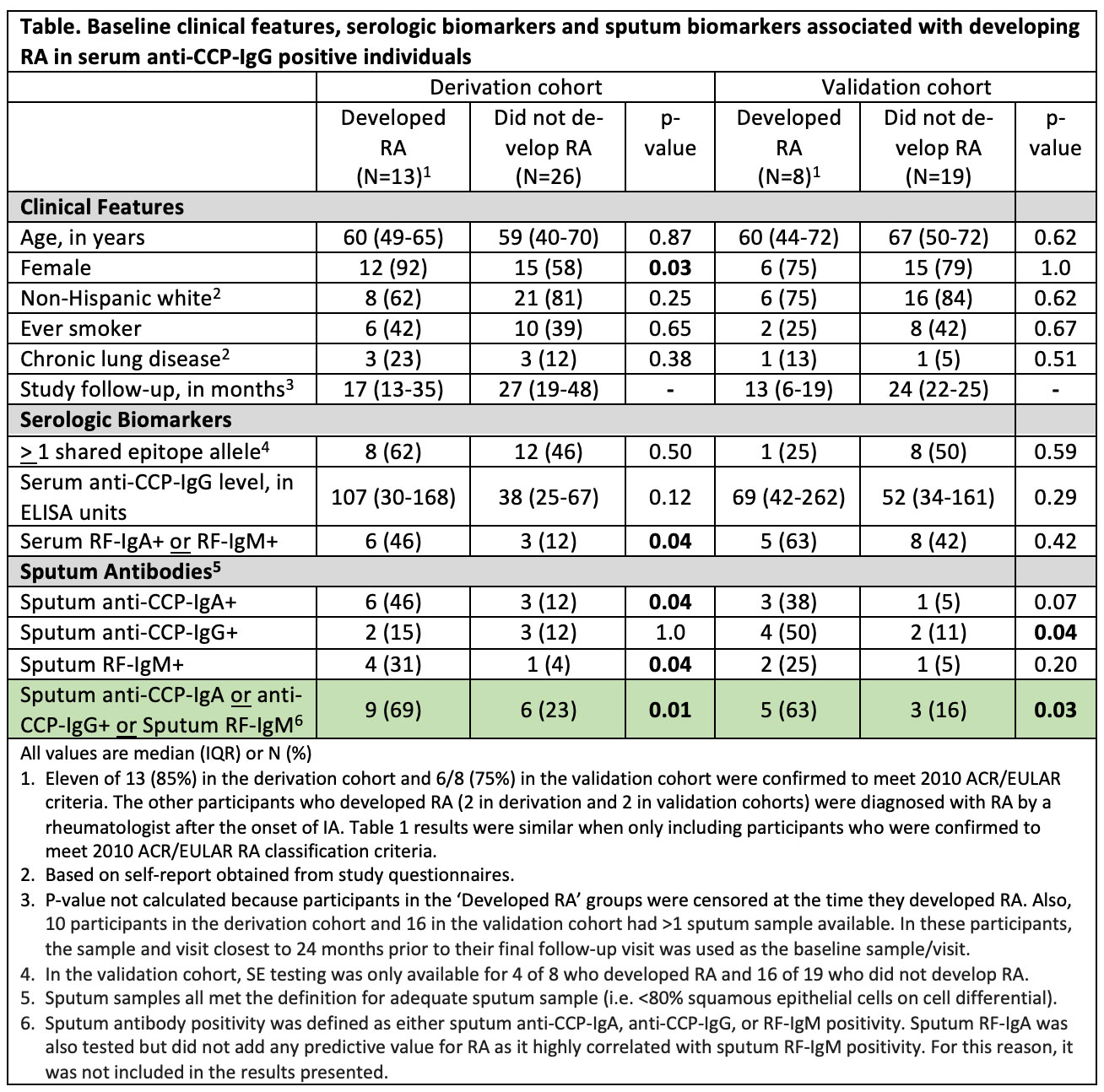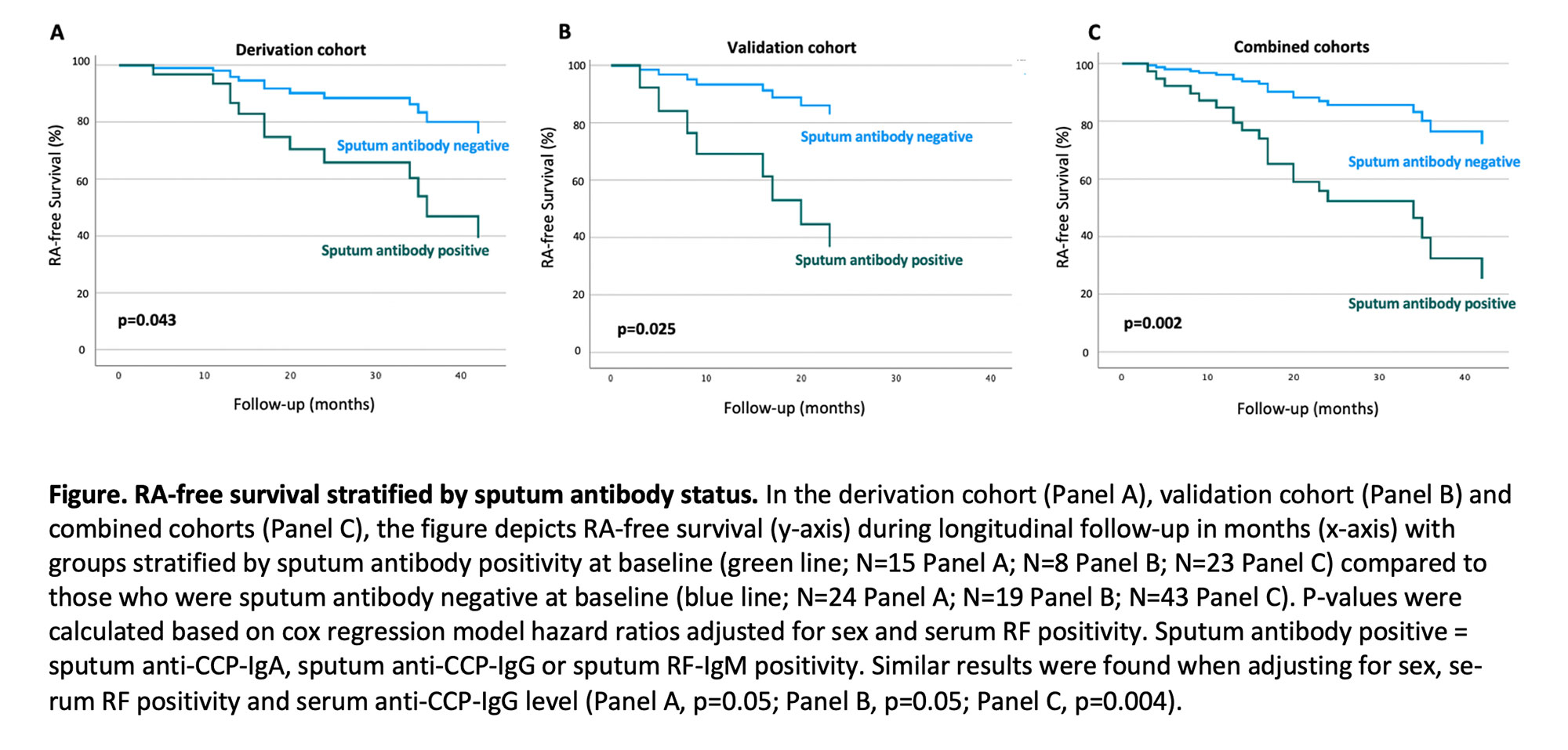Session Information
Date: Saturday, November 12, 2022
Title: Abstracts: RA – Diagnosis, Manifestations, and Outcomes I: Pre- and Early Disease
Session Type: Abstract Session
Session Time: 4:30PM-6:00PM
Background/Purpose: Presence of systemic anti-CCP-IgG antibodies in individuals without inflammatory arthritis (IA) strongly predicts developing future classified RA. However, published data also demonstrate that 50-70% of serum anti-CCP-IgG positive individuals do not develop RA during 3-5 years of follow-up, representing a limitation of this biomarker alone to predict imminent RA. Our group previously reported that a subgroup of serum anti-CCP-IgG positive individuals locally produce RA-related autoantibodies in the lung (measured in sputum). In this study, we evaluated the relationship between sputum RA-associated autoantibodies and the risk of transitioning from systemic autoimmunity to classified RA.
Methods: We evaluated 66 participants who were: 1) serum anti-CCP-IgG positive (CCP3, Werfen), 2) without IA on physical examination and 3) had a hypertonic saline-induced sputum sample available. Subjects were followed up to 5 years to determine incident RA (by 2010 ACR/EULAR criteria) or IA diagnosed as RA by a rheumatologist. A minimum of 12 months follow-up was required for individuals who did not develop RA. Subjects were included in the ‘derivation cohort’ (DC) if baseline samples were collected 2013-2019 (n=39), or in the ‘validation cohort’ (VC) if baseline samples were collected 2019-2021 (n=27). Baseline sputum supernatant and serum were tested by ELISA (Werfen) for anti-CCP-IgG, anti-CCP-IgA and RF-IgM. Sputum antibody positivity was defined as a level above the 95th percentile in a cohort of 97 healthy controls. Non-parametric and regression analyses were performed as appropriate.
Results: Thirteen (33%) of 39 DC participants and 8/27 (30%) VC participants developed RA (median 17 months). Prevalence of any sputum antibody (anti-CCP-IgG, anti-CCP-IgA or RF-IgM) was higher in subjects who developed RA compared to those who did not (DC, p=0.01; VC, p=0.03; combined cohorts, 67% vs. 20%, p< 0.001) (Table). The strongest single sputum antibody associated with developing RA was sputum anti-CCP-IgA (Table; DC, p=0.04; VC, p=0.07; combined cohorts, 43% vs. 9%, p=0.002). After adjusting for sex and serum RF positivity, any sputum antibody was independently associated with risk of developing RA (DC, HR=3.4 [95%CI 1.04-11.2]; VC, HR=5.4 [95%CI 1.2-23.1]; combined cohorts, HR=4.2 [95%CI 1.7-10.4]; Figure). Overall, sputum antibody positivity was 67% sensitive and 80% specific for future RA.
Conclusion: We found that sputum anti-CCP-IgA, anti-CCP-IgG or RF-IgM positivity was independently associated with a 4-fold risk of developing classified RA in serum anti-CCP-IgG positive at-risk individuals. Overall, sensitivity for who will develop RA increased from 32% (using baseline serum anti-CCP-IgG positivity alone) to 67% (using baseline serum anti-CCP-IgG positivity plus sputum antibody positivity). The high sensitivity and specificity, particularly within a cohort already at a higher risk of developing RA, supports the utility of adding sputum antibody testing to predictive models of RA. While future studies are needed, these data also support that immune dysregulation in the lung may causally contribute to transitions from systemic autoimmunity to arthritis in RA.
To cite this abstract in AMA style:
Wilson T, Welch J, Feser M, Bemis E, Lugo C, Firestein G, Bumol T, Norris J, Holers V, Deane K, Demoruelle K. Sputum RA-Associated Autoantibodies Independently Associate with Future Development of Classified RA in an At-Risk Cohort of Individuals with Systemic Anti-CCP Positivity [abstract]. Arthritis Rheumatol. 2022; 74 (suppl 9). https://acrabstracts.org/abstract/sputum-ra-associated-autoantibodies-independently-associate-with-future-development-of-classified-ra-in-an-at-risk-cohort-of-individuals-with-systemic-anti-ccp-positivity/. Accessed .« Back to ACR Convergence 2022
ACR Meeting Abstracts - https://acrabstracts.org/abstract/sputum-ra-associated-autoantibodies-independently-associate-with-future-development-of-classified-ra-in-an-at-risk-cohort-of-individuals-with-systemic-anti-ccp-positivity/


